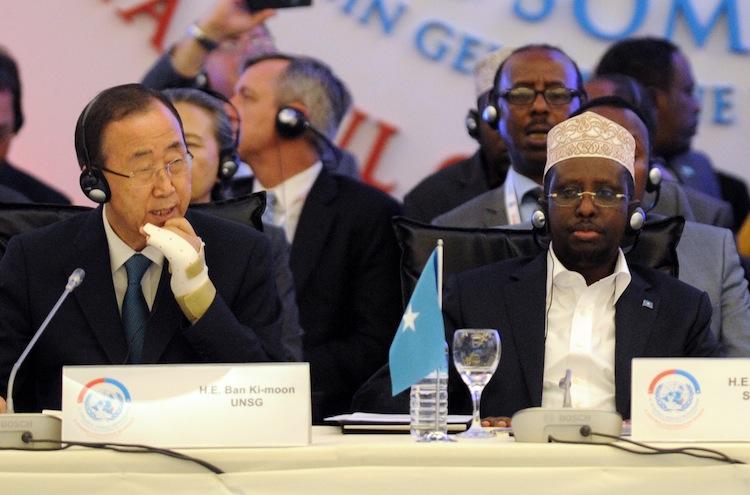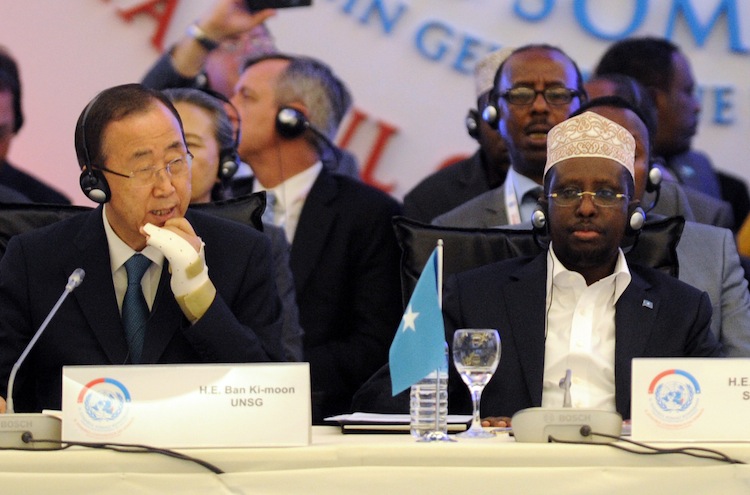The president of Somalia’s shaky transitional government said that if other nations give the impoverished country enough funds, it will take down pirates operating along its shores and in the Indian Ocean within a year.
Delivering remarks at an anti-piracy summit in Dubai, President Sheikh Sharif Sheikh Ahmed said he could easily deploy a task force to take down pirates based in Somalia.
“We are completely ready to combat this problem. Despite our limited funds we are ready to train and set up a marine force that would attack and dispel all pirate activities,” he said, according to the United Arab Emirates-based The National.
He estimated that it would cost only around $230 million—a third of the $700 million in ransom paid by international companies to secure hostage releases from pirates between 2008 and 2012—to tackle the problem within a year.
“We have between 5,000 and 6,000 men ready, and we want the international community to provide them with arms, materials, and equipment,” Ahmed elaborated.
The Somali president’s assertion may solve half the problem, according to some observers. In an address last year, Andrew Shapiro, assistant secretary of the Bureau of Political-Military Affairs in the U.S. State Department, said that combating piracy needs both political will and the capacity to implement it.
“There will be no end to piracy at sea until there is both political reconciliation and economic recovery on the ground in Somalia and a local government capable of and willing to enforce law and order on land and offshore”” said Shapiro in an address at the at the International Institute for Strategic Studies in March 2011.
While the political will may be there, capacity to execute appears lacking.
Somalia has been without a stable, central government since 1991 after the Marxist regime of Mohamed Siad Barre was toppled by local warlords, who participated in the Somali Civil War.
In its recently released Failed State Index, the Fund For Peace ranked Somalia as the No. 1 failed state in the world—for the fifth year in a row.
“The absence of a permanent national government for 20 years was aggravated in 2011 by an upsurge of violence, massive human rights abuses, and natural disasters. Worsened social conditions have added to political instability, which led to mass displacement and impoverishment,” wrote Fund for Peace.
In his opening address to the conference, which runs June 27–28, Sultan Ahmed bin Sulayem, chairman of DP World that runs Dubai ports, talked about the damaging effect piracy has on the Somali state.
“The fact is that attacks by pirates not just endanger the lives of hundreds of seafarers and disrupt vital economic activities, they also undermine efforts to restore prosperity and stability to Somalia.”
Sulayem noted that as delegates gathered, “pirates are holding more than 200 seafarers captive, in often appalling conditions.”
So far this year, there have been about 30 incidents involving pirates, which is down compared to the 175 incidents over 2011. The hijacking success rate is also down. However, at the same time, violence and mortality rates have gone up. In 2011, 24 seafarers were killed by pirates, compared to 8 in 2009.
On Wednesday, a South African couple who was freed by Somali pirates last week made it back to Johannesburg, according to South Africa’s Times Live newspaper. The two, Bruno Pelizzari and Debbie Calitz, were freed by Italian and Somali forces after being held for 20 months. The two were working as crewmembers on a yacht when they were captured off the coast of Tanzania.







